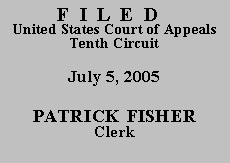

|
MICHAEL LEE SHAPIRO, |
|
Before BRISCOE, LUCERO, and MURPHY, Circuit Judges.
Shapiro was convicted in Utah state court of Rape and Forcible Sexual Abuse. His conviction was affirmed by the Utah Court of Appeals on February 7, 2002; the conviction became final on March 11, 2002, after the thirty-day period for seeking certiorari review in the Utah Supreme Court expired without Shapiro having filed for a writ of certiorari. See Utah R. App. P. 48. Shapiro filed the instant 28 U.S.C. § 2254 petition on May 24, 2004, more than two years and two months after his convictions became final, and more than one year and two months after the limitations period set out in 28 U.S.C. § 2244(d) had expired. Because Shapiro was clearly not entitled to statutory tolling under § 2244(d)(2), and because he had not argued that any equitable circumstances rescued him from the statutory limitations period, the district court denied Shapiro's petition as barred by the limitations period set out in § 2244(d).
Shapiro now seeks a COA to enable him to appeal the district court's denial of his § 2254 petition. A COA may issue "only if the applicant has made a substantial showing of the denial of a constitutional right." 28 U.S.C. § 2253(c)(2). "A petitioner satisfies this standard by demonstrating that jurists of reason could disagree with the district court's resolution of his constitutional claims or that jurists could conclude the issues presented are adequate to deserve encouragement to proceed further." Miller-El v. Cockrell, 537 U.S. 322, 327 (2003). This "requires an overview of the claims in the habeas petition and a general assessment of their merits." Id. at 336. When, however, the district court denies a habeas petition on procedural grounds without reaching the petitioner's underlying constitutional claim, a COA should issue only when the petitioner shows, at least, that jurists of reason would find it debatable whether the petition states a valid claim of the denial of a constitutional right and that jurists of reason would find it debatable whether the district court was correct in its procedural ruling. Slack v. McDaniel, 529 U.S. 473, 484 (2000).
Having undertaken a review of Shapiro's application for a COA and appellate filings, the district court's order, and the entire record before this court pursuant to the framework set out by the Supreme Court in Miller-El, this court concludes that Shapiro is not entitled to a COA. Shapiro's brief on appeal does not even address the limitations issue upon which the district court based its ruling, but instead focuses exclusively on the merits of his claims. In any event, it is clear that Shapiro is not entitled to statutory tolling because he did not file any state petitions for post-conviction relief that would trigger the application of 28 U.S.C. § 2244(d)(2). Likewise, the district court did not abuse its discretion in declining to equitably toll the limitations period in the absence of any arguments in that regard on the part of Shapiro. See Harms v. IRS, 321 F.3d 1001, 1006 (10th Cir. 2003) (holding that district court's decision on equitable tolling is reviewed for abuse of discretion). The district court's resolution of Shapiro's § 2254 petition is not reasonably subject to debate and the issues he seeks to raise on appeal are not adequate to deserve further proceedings. Accordingly, this court DENIES Shapiro's request for a COA and DISMISSES this appeal.
Entered for the Court
PATRICK FISHER, Clerk of Court
By
Deputy Clerk